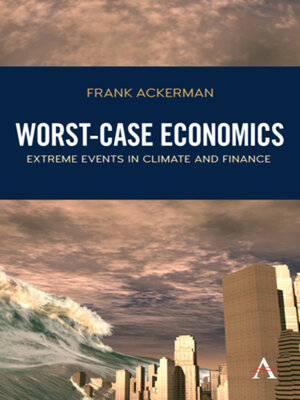Worst-Case Economics
ebook ∣ Extreme Events in Climate and Finance · Anthem Frontiers of Global Political Economy and Development
By Frank Ackerman

Sign up to save your library
With an OverDrive account, you can save your favorite libraries for at-a-glance information about availability. Find out more about OverDrive accounts.
Find this title in Libby, the library reading app by OverDrive.



Search for a digital library with this title
Title found at these libraries:
| Library Name | Distance |
|---|---|
| Loading... |
Worst-case scenarios are all too real, and all too common. The financial crisis of 2008 was not the first or the last to destroy jobs, homeownership and the savings of millions of people. Hurricanes clobber communities from New York to Bangladesh. How bad will the next catastrophe be, and how soon will it happen?
Climate and financial crises are serious events, requiring vigorous responses. Yet public policy is trapped in an obsolete framework, with a simplistic focus on average or likely outcomes rather than dangerous extremes. What would it take to create better analyses of extreme events in climate and finance, and an appropriate policy framework for worst-case risks? 'Worst-Case Economics: Extreme Events in Climate and Finance' offers accessible and surprising answers to these crucial questions.
|Why do climate and financial crises pose such extreme risks? And what does it take to respond effectively to those risks? Extreme weather events – storms and sea-level rise, heat waves, droughts and floods – seem ever more common and extreme, while scientists warn of even greater climate risks ahead. Financial failures on the scale of 2008 make a mockery of the supposed efficiency of the market economy. None of this would be possible in the world as imagined by conventional economics – an imaginary land of gradualism, equilibrium, well-informed rationality and the win-win solutions dealt by the invisible hand.
The erratic rhythm of boom and bust in financial markets could be explained either by the patterns of crowd-following behaviour among investors, or by the unequal distribution of wealth (and the impact of the largest investors on the markets). Climate crises reflect the fact that natural systems can reach tipping points or critical transitions, where gradual change gives way to large-scale discontinuous changes. The economics of climate change has lagged behind the science, understating the severity of the problem and the likelihood of a crash.
While the causes of climate and financial extremes are distinct, the implications for public policy have much in common. The frequency of extreme events, of varying sizes, means that there is no way to predict the likely size of future crises. The traditional approach to risk aversion cannot account for longstanding patterns in financial markets. Better theories of risk call for more precautionary approaches to both financial and climate policy. In the frequent cases in which potential outcomes have unknown probabilities, the best policy is based on the worst-case credible scenario. When a single catastrophic risk commands everyone's attention, a World War II-style, costs-be-damned mobilization is the right response. There is no formula for perfect responses to extreme risks, but there are important guideposts that point toward better answers.







